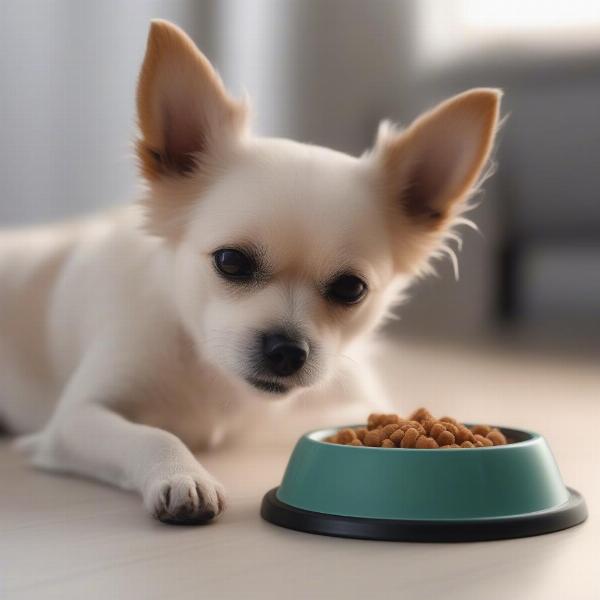A small dog bowl isn’t just a miniature version of a larger one; it’s a crucial element of your small breed’s comfort and well-being. Finding the perfect small dog bowl can significantly impact your furry friend’s eating habits and overall health. From the right size and material to design and placement, several factors contribute to making mealtime a positive experience for your small companion. Let’s explore the key aspects of selecting the ideal small dog bowl.
Understanding the Needs of Small Breeds
Small dog breeds often face unique challenges at mealtime. Their shorter stature can make reaching into deep bowls difficult, leading to strained necks and potential back problems. A shallow, appropriately sized small dog bowl allows them to eat comfortably without discomfort. Additionally, some small breeds have short noses (brachycephalic breeds), which necessitates a specifically designed small dog bowl that facilitates easy access to food.
Sizing Up the Perfect Small Dog Bowl
Choosing the right size small dog bowl is paramount. Too large, and your dog might feel overwhelmed; too small, and they might struggle to get enough food in each bite. Consider your dog’s breed, age, and eating habits. For toy breeds, a bowl holding about 1/2 to 1 cup of food is usually sufficient. For slightly larger small breeds, a bowl with a 1 to 2 cup capacity might be more appropriate.
 Small Dog Using a Raised Bowl
Small Dog Using a Raised Bowl
Material Matters: Selecting a Durable and Safe Small Dog Bowl
Small dog bowls are available in a variety of materials, each with its pros and cons. Stainless steel is a popular choice for its durability, ease of cleaning, and resistance to bacteria. Ceramic bowls are another great option, offering a heavier base that prevents tipping and a variety of aesthetically pleasing designs. Plastic bowls are lightweight and inexpensive, but they can be chewed on and harbor bacteria more easily.
Design Considerations for Small Dog Bowls
The design of a small dog bowl goes beyond aesthetics. Consider bowls with non-slip bottoms to prevent spills and movement during mealtime. Raised bowls are beneficial for some small breeds, promoting better posture and reducing strain on their necks and backs. For brachycephalic breeds, slanted or tilted bowls are designed to make eating easier.
Placement and Maintenance of Your Small Dog Bowl
Where you place your small dog’s bowl is also important. Choose a quiet, accessible location where your dog feels comfortable eating. Clean the bowl regularly with soap and water, and replace it if it becomes damaged or excessively worn.
Conclusion
Choosing the right small dog bowl is a simple yet crucial step in ensuring your small breed’s well-being. By considering the factors discussed above, you can make mealtime a comfortable and enjoyable experience for your furry friend. Remember, a small dog bowl isn’t just a dish; it’s an investment in your pet’s health and happiness.
FAQ
- How often should I clean my small dog’s bowl? Ideally, after every meal. At the very least, wash it daily.
- What’s the best material for a small dog bowl? Stainless steel is generally recommended for its durability and hygiene.
- Are raised bowls good for all small dogs? They can be particularly beneficial for older dogs or breeds prone to neck problems.
- How do I choose the right size small dog bowl? Consider your dog’s breed, size, and eating habits.
- Can I use a regular bowl for my small dog? While possible, a small dog bowl is designed for their specific needs and often more comfortable.
- Where should I place my small dog’s bowl? A quiet, accessible location where your dog feels comfortable.
- What should I do if my dog’s bowl is chipped or cracked? Replace it immediately to avoid potential injury or bacterial growth.
Related Articles
About ILM Dog
ILM Dog (https://ilmdog.com) is your trusted international resource for expert dog care advice. We offer a wide range of resources and guidance, encompassing breed selection, health and medical care, training, nutrition, grooming, exercise, puppy and senior dog care, travel tips, and product recommendations. With a focus on providing practical, reliable information, we empower dog owners worldwide to make informed decisions about their furry companions. Contact us today for expert guidance and support! Email: [email protected], Phone: +44 20-3965-8624.